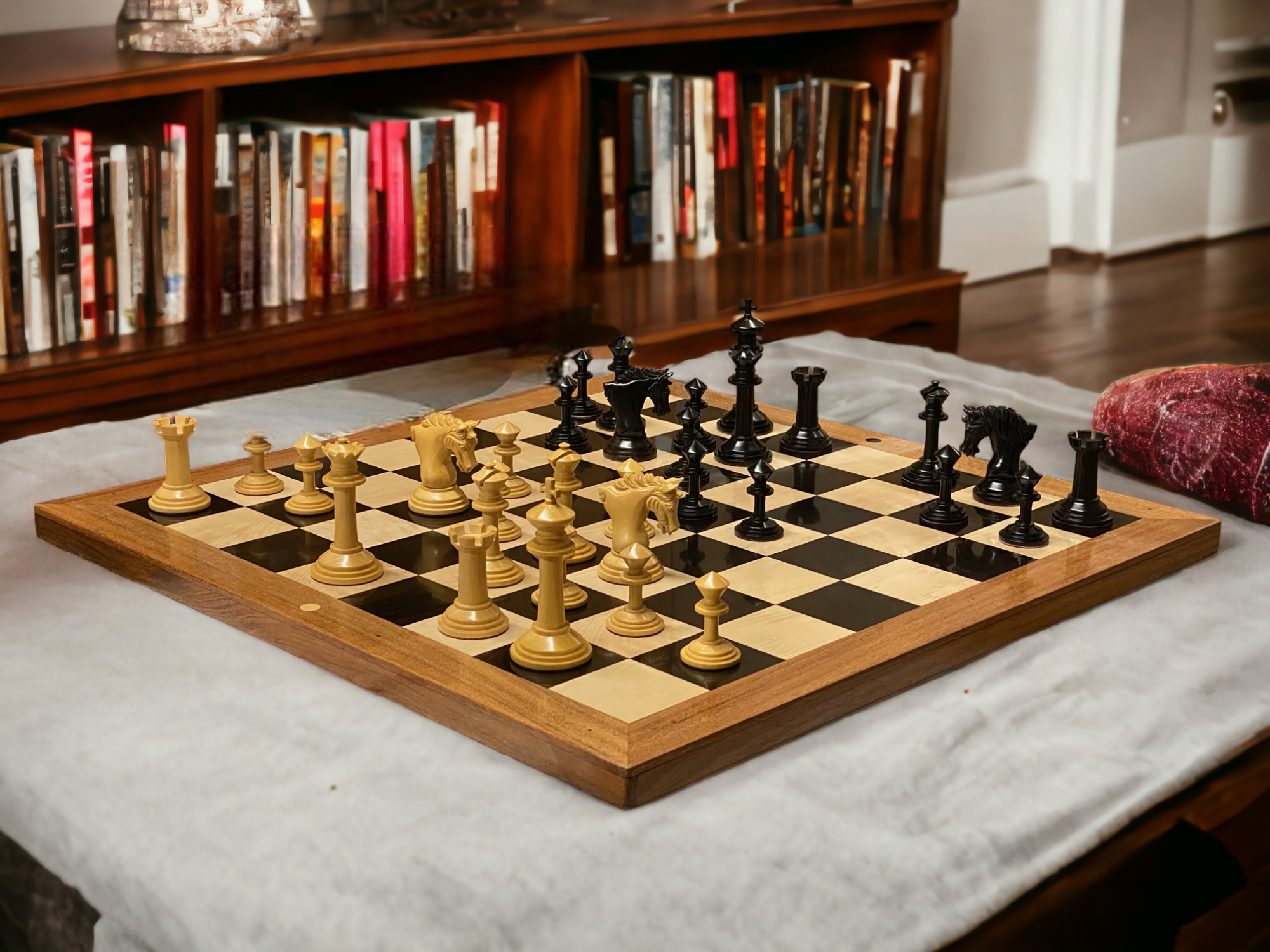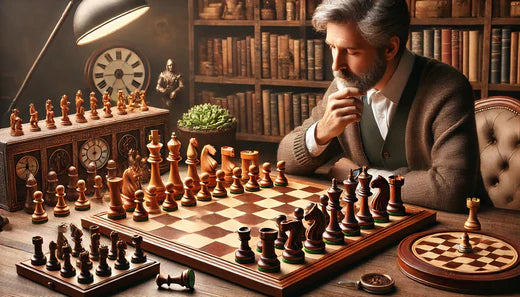Chess has been a revered game across cultures and centuries, often celebrated for its intellectual challenges and intrinsic beauty. This ancient game is more than just a pastime; it is a profound medium through which comprehensive strategic thinking is cultivated. As chess enthusiasts embrace diverse elements of the game, one standout feature that captivates players and collectors alike is the Wenge Chess Board. In this article, we will uncover the myriad ways in which chess enhances strategic thinking and how the Wenge Chess Board lays the perfect stage for this cerebral contest.
The Historical Significance of Chess
Chess is believed to have originated in India during the Gupta Empire, where it was known as Chaturanga in the 6th century. This early form of chess had significant influences on strategy and military tactics. Over centuries, it evolved and permeated into cultures around the globe, each adapting rules and styles of gameplay. The game we know today became standardised in the 15th century, contributing to its status as a global intellectual pursuit.
The Cognitive Benefits of Playing Chess
Numerous studies have revealed that chess engages multiple cognitive processes. Players must think ahead, anticipate their opponent’s moves, and devise strategies to achieve victory. Here are some cognitive benefits derived from playing chess:
- Improved Problem-Solving Skills: Chess requires players to approach challenges systematically, breaking down complex situations into manageable parts.
- Enhanced Memory: Remembering moves and strategies from previous games boosts memorisation skills.
- Better Concentration: Sustaining attention is vital in chess as a whole game can shift based on a single move.
- Critical Thinking: Players must evaluate their moves critically, considering both immediate outcomes and long-term consequences.
How Chess Develops Strategic Thinking
At the core of chess lies strategy. Whether a novice or a grandmaster, every player must formulate methods to outsmart opponents. Developing strategic thinking through chess can influence various aspects of life, such as business decisions and personal relationships.
Thinking Several Moves Ahead
One of the fundamental principles of chess is the ability to think several moves ahead. This involves weighing potential outcomes and considering the ramifications of each move. By practising this essential skill, players learn to strategise not only in the game but also in everyday scenarios. This skill is crucial in the decision-making processes both in personal lives and professional settings.
Learning from Mistakes
Chess promotes a growth mindset. Losing a game provides valuable lessons, urging players to analyse their mistakes and seek solutions. A player may reflect on why a particular move led to a loss and what alternative strategies could have been employed. This iterative process of trial and error builds resilience and adaptability—traits that are beneficial beyond the chessboard.
Embracing Constraints and Resources
Each chess game unfolds on a specifically defined board—the Wenge Chess Board, for instance, not only offers an aesthetically pleasing visual but also delineates the battlefield for intellectual war. Players quickly learn to maximise the movement of their pieces while working within constraints, similar to handling limited resources in real-life situations. This skill is transferable to fields like project management, where leveraging available resources is pivotal to achieving goals.
Chess as a Tool for Educators
The teaching of chess in educational environments is becoming increasingly popular due to its educational benefits. Many school systems have integrated chess programs to enhance students' academic performance. Here’s how chess is utilised in educational contexts:
- Boosting Academic Performance: Research shows that students who play chess perform better in mathematics and reading comprehension.
- Promoting Social Skills: Chess encourages respect among peers, cultivating values like patience and sportsmanship.
- Enhancing Cognitive Development: Chess stimulates critical thinking and creativity in young learners, providing a solid foundation for various academic disciplines.
The Allure of the Wenge Chess Board
As we discuss the aesthetics of chess, the Wenge Chess Board stands out as a symbol of elegance and sophistication. Made from wenge wood, visually striking with its dark hues and rich textures, it enhances the overall chess experience. But its significance extends beyond looks; it also embodies the blend of tradition and modernity inherent in chess.
Why Choose a Wenge Chess Board?
Investing in a Wenge Chess Board is not just about the game's tactile qualities; it is about embracing a piece of art that facilitates strategic deep thinking. Here are a few reasons why players might choose a Wenge Chess Board:
- Durability: Wenge is known for its robust nature. A well-crafted board can endure years of play.
- Unique Visual Appeal: The unique design of the wenge wood captivates the players and onlookers alike.
- Elevated Gameplay: Playing on a quality board can enhance focus and immersion in the game.
Chess in the Digital Era
With the rise of technology, online chess platforms have gained immense popularity. They create a global community of chess enthusiasts who aspire to hone their skills and share strategies. Despite this digital shift, the traditional physical game, especially on an exquisite Wenge Chess Board, offers value that technology cannot replicate. The tactile experience, the sounds of pieces moving, and the visual beauty create an immersive experience that screen-based formats lack.
Combining the Best of Both Worlds
The ability to transition between physical and digital chess allows players flexibility in their practice and study. People can engage in online tournaments or play against diverse opponents worldwide, then practice their strategic thinking on a captivating Wenge Chess Board at home. This hybrid approach enriches the chess experience by providing different channels to develop skills.
Chess Clubs and Community Engagement
Joining a local chess club not only provides opportunities for competitive play but also fosters community engagement. Players gather to share strategies, challenge one another, and build friendships. Clubs often host tournaments, providing platforms for players to compete and learn, reinforcing the idea that chess is a social exercise in addition to a solitary pursuit.
Networking Through Chess
Networking in a chess club fosters professional relationships. Players often cross paths from varied professional backgrounds, leading to potential collaborations or friendships beyond the game. This unique blend of social strategic thinking enriches both personal and professional lives.
A Journey of Growth and Self-Discovery
The role of chess in developing strategic thinking cannot be overstated. As players engage in this timeless game, they embark on an enriching journey of growth, self-discovery, and resilience. Each match, each piece moved on a Wenge Chess Board becomes an opportunity to refine thinking and broaden horizons. More than just a game, chess shapes leaders, problem-solvers, and thinkers of tomorrow.
As you dive into the world of chess, perhaps it’s time to invest in a Wenge Chess Board to elevate your experience. The blend of beauty and strategic depth creates a profound environment for sharpening your mind. Embrace the challenge, enjoy the camaraderie, and let chess guide you to reach new heights in your strategic journey.
Embark on a journey through the Shopify store of another user. Click here to visit their store. Please note that this is a promotional link, and we do not guarantee the content of the linked store.



